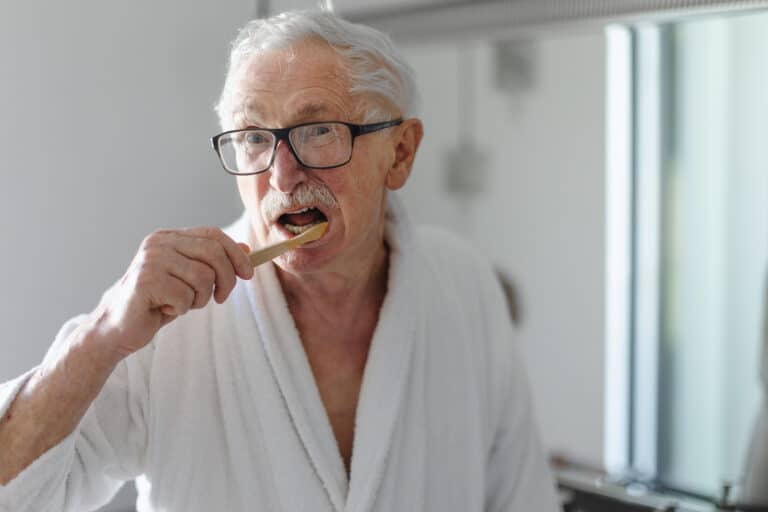Every morning and night my parents would remind me, “Take good care of your teeth; they’re the only set you’re going to get.” Little did I know that there was an option for a second set later in life- a set of dentures! Dentures have made remarkable advancements over the years. In the past, typical denture materials in Europe included human and animal teeth, as well as ivory. It wasn’t until the 1950s when plastics and resins were developed. These tough and durable materials now constitute most of the dentures used by modern denturists. Understanding what dentures were like in the past should deepen our appreciation for the dental appliances available to us today. While the past can offer us interesting tidbits on how dentures have evolved, in this article, we will examine proactive steps to caring for your ‘modern’ dentures and maintaining your oral health while wearing them.
Denture and Gum Care:
• While cleaning your dentures, you might want to consider placing a towel on your counter or in your sink to prevent any potential cracking or breakage if they happen to fall.
• Do not let your dentures dry out. When you remove your dentures, soak them in a glass with water or a denture cleaning solution. If dentures are left out to dry, they can potentially become brittle, warped, stained and risk increased bacterial growth.
• Never place your dentures in hot water, it will cause the material to warp.
• Brush, clean and rinse your dentures daily.
• Give your gums a break. Remove your dentures at night to give your mouth tissues a chance to rest and recover. Keeping dentures in place 24/7 can lead to issues such as tissue irritation, fungal infections, and pressure sores.
• If you are new to dentures, be aware that it usually takes up to 30 days before your gums, cheeks and tongue adjust to wearing an oral appliance.
• Clean your gums: Use a soft brush to gently brush your gums, the roof of your mouth and tongue. If you don’t want to use a toothbrush, consider trying gauze or a washcloth. You can also use the washcloth to carefully massage your gums to remove any food or residue in your mouth.
• Be sure to keep in mind that the shape of your mouth can frequently change, especially if you don’t have your natural teeth. Without your natural teeth, your gums can recede and there is the potential for bone loss. Due to these changes, it is crucial to schedule regular appointments with your denturist to ensure proper denture fit and prevent issues such as loose or poorly fitting dentures.
While my parent’s advice about preserving our natural teeth holds true, the evolution of dentures offers a practical alternative for those seeking a second chance at a complete smile. Remember, having dentures is not just about having a beautiful smile, although that’s undoubtedly a bonus; it’s also about relishing the pleasures of good food. By diligently following these recommended care steps for your dentures, you can fully appreciate one of the most delightful functions of your mouth- the joy of chewing and tasting! So, as you follow these tips and tricks, you can savor a bite of real food, reveling in the diverse tastes and flavours that the act of eating brings.
If you or an ageing loved one are considering Home Care in Spruce Grove, please contact the caring staff at Serving Hands Senior Care today. Call (780) 963-1516
Premiere Home Health and Senior Home Care services in Spruce Grove, Stony Plain, Devon, St. Albert, Edmonton, Onoway, Leduc, Parkland County and surrounding communities since 2016.
- Seeing Clearly: Glaucoma Awareness for Seniors - March 10, 2025
- The Sounds of Life: Hearing Aid Care for Seniors - March 3, 2025
- Save a Life Today!! ❤️ - February 18, 2025









